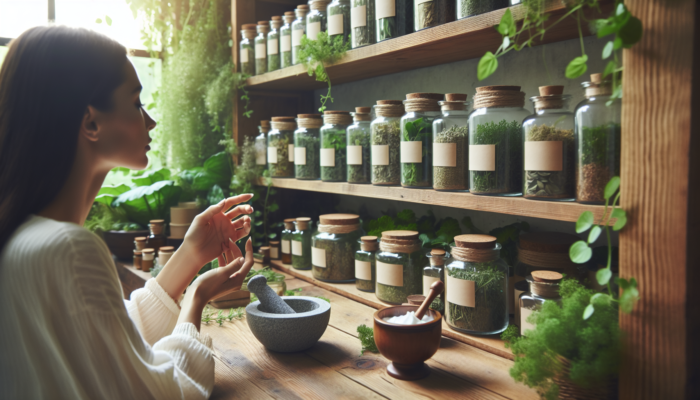Discover Powerful Herbal Solutions for Rejuvenating and Hydrating Dry Skin
Understanding the Root Causes and Common Symptoms of Dry Skin

Dry skin, medically known as xerosis or xeroderma, can arise from a multitude of factors, including environmental conditions and various health issues. Common factors contributing to this condition include harsh cold weather, low humidity levels, and frequent washing with harsh soaps that strip the skin of its natural oils. Additionally, certain medical conditions such as diabetes, hypothyroidism, and psoriasis can significantly exacerbate skin dryness, emphasizing the need to understand these underlying causes for effective treatment.
The symptoms of dry skin can present differently in each person, yet they often manifest as a feeling of tightness, rough texture, and visible flakiness. In more severe cases, cracking can occur, accompanied by itchiness or inflammation that leads to discomfort. Identifying and recognizing these symptoms is crucial when seeking herbal remedies for dry skin, as this knowledge allows for the selection of the most appropriate treatments tailored to individual skin conditions.
By pinpointing the specific triggers for your dry skin, you can take proactive steps to prevent further issues. For instance, if you notice your skin worsens during the winter months, using a humidifier or wearing protective clothing may provide relief. Adjusting your approach based on your symptoms and lifestyle choices can greatly enhance the effectiveness of the remedies you choose.
Harnessing the Healing Properties of Herbs for Enhanced Skin Care
The remarkable effectiveness of herbal remedies for dry skin can be attributed to the powerful compounds found in various plants. Many herbs are endowed with natural moisturizing, anti-inflammatory, and healing properties that can transform and rejuvenate your skin. For example, specific plant compounds such as flavonoids and saponins have been scientifically shown to significantly enhance skin hydration, making them invaluable in skincare routines.
Aloe vera, a well-known staple in countless skincare products, exemplifies these benefits through its hydrating properties. Rich in polysaccharides, aloe vera helps retain moisture in the skin while its anti-inflammatory characteristics alleviate irritation. Similarly, chamomile is packed with antioxidants, which protect the skin from environmental stressors that can lead to dryness and irritation.
A wealth of studies supports the scientific basis behind these herbs, reinforcing their effectiveness in treating various skin conditions. By integrating herbal remedies for dry skin into your daily skincare regimen, you embrace a blend of ancient wisdom and modern science that promotes optimal skin health.
Ensuring Safety: Essential Precautions and Allergy Awareness When Using Herbal Remedies
Although herbal remedies for dry skin can provide substantial relief, it is essential to use them with caution. Allergic reactions to specific herbs may occur, potentially leading to further irritation or adverse effects, so it is advisable to conduct a patch test before applying any remedy broadly. This simple procedure involves applying a small amount of the herbal treatment to an inconspicuous area of skin and monitoring for any adverse reactions over a 24-hour period.
Moreover, not all herbs are suitable for everyone. Pregnant or breastfeeding women and those with pre-existing health conditions should consult a healthcare professional before introducing new herbal remedies into their skincare routines. Additionally, some herbs might interact with medications, highlighting the necessity of keeping your healthcare provider informed about your use of herbal products.
By prioritizing safety, you can fully enjoy the benefits of herbal remedies for dry skin while minimizing potential risks. Whenever possible, opt for high-quality, organic sources of herbs, as this can enhance their effectiveness and reduce the risk of contamination or adverse reactions.
Your Complete Guide to the Best Herbal Remedies for Dry Skin

Aloe Vera: The Ultimate Natural Hydrator for Skin
Aloe vera is widely recognized as one of the most effective herbal remedies for dry skin, and this reputation is well-founded. This succulent plant is celebrated for its extraordinary hydrating properties, making it a popular choice in both topical applications and dietary supplements. Its gel-like consistency allows for easy absorption into the skin, delivering moisture and essential nutrients directly to the areas that require the most attention.
The key active ingredients in aloe vera include vitamins A, C, and E, as well as a range of B vitamins, all of which contribute to its moisturizing and healing effects. Additionally, aloe vera contains amino acids and fatty acids that promote skin regeneration and repair. When applied to dry skin, aloe vera not only hydrates but also alleviates inflammation and redness commonly associated with dryness.
For effective use, apply fresh aloe vera gel directly from the leaf onto clean skin, allowing it to absorb for approximately 20 minutes before rinsing off. Alternatively, you can blend aloe vera gel with other beneficial ingredients like honey or coconut oil to boost its moisturizing properties. Consistent application can lead to significantly softer and more supple skin, establishing aloe vera as a powerful ally in the fight against dryness.
Chamomile: The Gentle Soother for Skin Irritation and Dryness
Chamomile, often linked to its soothing effects in tea, also offers remarkable benefits as one of the leading herbal remedies for dry skin. This delicate flower is rich in antioxidants and possesses anti-inflammatory properties that help calm irritated skin and diminish redness.
The flavonoids present in chamomile, particularly apigenin, have been shown to promote skin health by combating oxidative stress. This makes chamomile an excellent choice for those experiencing dryness, inflammation, and heightened sensitivity. Its gentle nature ensures it is suitable for all skin types, including sensitive skin.
To fully benefit from chamomile, consider brewing a strong chamomile tea and allowing it to cool. You can use this tea as a facial rinse or soak a cotton pad in it and apply it to dry areas for a soothing treatment. For an extra hydrating boost, combine chamomile tea with honey to create a nourishing face mask.
Incorporating chamomile into your skincare routine can provide the dual advantages of hydration and soothing relief, making it a crucial component in your herbal remedies for dry skin toolkit.
Calendula: The Champion of Skin Regeneration and Repair

Calendula, commonly referred to as marigold, is renowned for its extraordinary ability to repair and regenerate skin. This vibrant flower boasts powerful anti-inflammatory and antiseptic properties, making it one of the most effective herbal remedies for dry skin. Its high concentrations of flavonoids and carotenoids actively promote healing and rejuvenation, particularly beneficial for dry and cracked skin.
Calendula’s soothing properties provide immediate relief from the discomfort of dry skin, alleviating feelings of tightness and irritation. Additionally, its ability to promote cell turnover can significantly improve the overall texture and appearance of the skin. This makes calendula especially advantageous for individuals suffering from conditions such as eczema or dermatitis, where the skin barrier is often compromised.
To effectively utilize calendula, create a simple infused oil by steeping dried calendula flowers in a carrier oil, such as olive or almond oil, for several weeks. This infused oil can be applied directly to dry areas or used as a base for homemade balms and lotions. Regular use of calendula can lead to healthier, more resilient skin, solidifying its status as an essential component of your herbal remedies for dry skin collection.
Simple DIY Recipes and Applications for Herbal Remedies for Dry Skin
Creating Custom Herbal Face Masks for Optimal Hydration
Making your own herbal face masks is an excellent way to incorporate herbal remedies for dry skin into your skincare routine. These masks allow you to customize ingredients to specifically address your skin concerns, ensuring maximum hydration and nourishment. Here are a few straightforward recipes to help you get started.
1. Aloe and Honey Mask: Mix equal parts of fresh aloe vera gel and raw honey. Apply this mixture to your face, leaving it on for 20 minutes before rinsing with lukewarm water. The aloe hydrates your skin, while the honey adds moisture and has antibacterial properties.
2. Chamomile and Oat Mask: Brew a strong chamomile tea and allow it to cool. Combine the cooled tea with ground oats to create a paste. Apply to your face and let it sit for 15-20 minutes. This mask will soothe irritation and provide gentle exfoliation thanks to the oats.
3. Calendula and Yogurt Mask: Blend calendula-infused oil with plain yogurt to create a creamy mask. Apply this mixture to your face and leave it on for 15-30 minutes. The yogurt hydrates and exfoliates the skin, while the calendula promotes healing.
Regular use of these masks can greatly improve your skin's texture and hydration levels, making them a vital part of your skincare regimen.
Crafting Herbal Oils and Balms: Nourishing Your Skin Naturally
Herbal oils and balms can effectively provide lasting moisture to dry skin. By infusing carrier oils with the beneficial properties of herbs, you can create nourishing products that hydrate and protect your skin. Here’s how to create your own herbal oil and balm.
Herbal Oil: Start with a carrier oil, such as sweet almond or jojoba oil. Place dried herbs like calendula or chamomile in a jar and cover them with the carrier oil. Seal the jar and let it sit in a warm, sunny spot for about two weeks, shaking it occasionally to mix. Strain the oil and store it in a dark glass bottle. This herbal oil can be used for massage or mixed into your regular moisturizer for an extra hydration boost.
Herbal Balm: To create a balm, combine your herbal oil with beeswax in a double boiler, using a ratio of about one part beeswax to four parts oil. Once melted and blended, pour the mixture into small containers and allow it to cool completely. This balm can be applied to dry patches of skin for prolonged moisture and protection.
By crafting your herbal oils and balms, you ensure that you are using natural, chemical-free products tailored to your skin’s unique needs, effectively harnessing the benefits of herbal remedies for dry skin.
Indulging in Therapeutic Herbal Baths: A Luxurious Approach to Skin Care
Herbal baths offer a luxurious and effective way to alleviate dry skin while also promoting relaxation. Incorporating herbs into your bathing routine can enhance the overall experience, providing both physical and mental health benefits.
Various ingredients can be used to create an herbal bath. Oatmeal is particularly effective for dry skin, acting as a natural moisturizer and soothing agent. Grind oats into a fine powder and add them to your bathwater. You may also include chamomile flowers or lavender for their calming effects and delightful scent.
For a more concentrated herbal infusion, consider creating a herbal sachet. Fill a muslin bag with dried herbs like calendula, chamomile, and lavender, and steep it in hot water as you fill your tub. This process releases the beneficial properties of the herbs into your bathwater, enhancing the experience.
Soaking in a herbal bath not only hydrates the skin but also creates a tranquil environment for relaxation. After bathing, it is recommended to gently pat your skin dry and apply a moisturizer to lock in the hydration, maximizing the benefits of your herbal remedies for dry skin.
Enhancing Skin Health: Essential Lifestyle and Dietary Tips for Managing Dry Skin
Proper Hydration: The Cornerstone of Healthy Skin
Maintaining adequate hydration is fundamental for achieving healthy, supple skin. While topical applications of herbal remedies for dry skin provide considerable benefits, internal hydration is equally vital. As the body's largest organ, the skin requires sufficient water intake to function optimally and retain moisture.
Drinking an adequate amount of water daily is crucial for overall health and has a direct impact on skin appearance. Aim for at least eight glasses of water daily, adjusting your intake according to your activity levels and environmental conditions. Including hydrating foods such as cucumbers, oranges, and watermelon in your meals can further promote skin hydration.
Moreover, consider minimizing your consumption of dehydrating substances like caffeine and alcohol, which can contribute to dry skin. Prioritizing hydration will significantly improve your skin’s moisture levels and overall complexion, complementing the benefits of herbal remedies for dry skin.
Nutritious Diet: Foods That Enhance Skin Vitality
Your dietary choices play a critical role in the health of your skin. Certain foods are celebrated for their skin-nourishing properties; incorporating these into your meals can help combat dryness from the inside out. Omega-3 fatty acids, found in fatty fish, flaxseeds, and walnuts, are particularly effective in maintaining skin barrier function and hydration.
Foods high in antioxidants, such as berries, spinach, and sweet potatoes, help protect against oxidative stress and inflammation that can exacerbate dry skin. Additionally, foods rich in Vitamins A, C, and E can support healthy skin regeneration and shield against environmental damage.
Including a variety of colorful fruits and vegetables in your diet ensures that you receive a comprehensive spectrum of nutrients essential for skin health. Combining dietary adjustments with herbal remedies for dry skin can amplify results, helping you achieve a radiant complexion.
Managing Stress: Understanding Its Impact on Skin Health
Stress has a profound effect on skin health, often leading to conditions such as acne, eczema, and dryness. During periods of stress, the body releases cortisol, which increases oil production and can worsen skin problems. Therefore, effectively managing stress is crucial for maintaining healthy skin.
Incorporating relaxation techniques such as yoga, meditation, or deep breathing exercises into your daily routine can significantly reduce stress levels. Regular physical activity also releases endorphins that uplift mood and enhance overall well-being.
Furthermore, consider utilizing herbal remedies for dry skin, like chamomile or lavender, known for their calming properties. These herbs can soothe both the skin and the mind, fostering a holistic approach to stress management and promoting healthier skin.
Special Considerations When Using Herbal Remedies for Dry Skin
Choosing the Right Herbal Remedies for Sensitive Skin
Selecting appropriate herbal remedies for dry skin is essential, particularly for individuals with sensitive skin. Sensitive skin can react adversely to many ingredients, making it crucial to choose gentle, soothing herbs that minimize the risk of irritation.
Chamomile stands out with its anti-inflammatory properties, making it an excellent option for sensitive skin types. It helps calm redness and irritation while simultaneously providing hydration. Likewise, aloe vera is celebrated for its gentle nature and ability to soothe even the most delicate skin.
Always begin with a patch test to ensure compatibility with your skin when using herbal remedies. Additionally, consider formulating your remedies with fewer ingredients to avoid overwhelming your skin. By selecting appropriate herbs and being mindful of your skin’s sensitivities, you can effectively manage dryness while minimizing the risk of adverse reactions.
Targeted Herbal Remedies for Eczema and Psoriasis Management
Conditions such as eczema and psoriasis present unique challenges in managing dry skin. These chronic conditions often require specialized approaches, and certain herbal remedies for dry skin can be particularly effective in alleviating symptoms.
Calendula is one of the most powerful herbs for managing eczema and psoriasis due to its robust anti-inflammatory and healing properties. It can significantly reduce itching, redness, and flakiness, leading to healthier skin. Additionally, tea tree oil, known for its antiseptic properties, can help control flare-ups and prevent infections.
Incorporating these herbs into your skincare routine through topical applications or infused oils can provide relief from the discomfort associated with these conditions. However, it is vital to consult with a healthcare professional for personalized advice and treatment options tailored to your specific needs.
Gentle Herbal Remedies for Treating Dry Skin in Children
Extra caution is necessary when addressing dry skin in children, as their skin is often more delicate and sensitive than that of adults. When considering herbal remedies for dry skin for children, it is essential to choose gentle, non-irritating options that are safe for young skin.
Aloe vera is an excellent choice for children due to its soothing properties, and it can be applied directly to affected areas. Additionally, chamomile-infused oils can effectively calm irritation and provide essential moisture.
Always perform a patch test before introducing any new remedy to ensure no allergic reactions occur. Moreover, consult with a pediatrician before using herbal treatments on infants or young children to ensure their safety.
Inspiring Success Stories with Herbal Remedies for Dry Skin
Case Study: A Remarkable Transformation of Severe Dry Skin
One inspiring case study features a 35-year-old woman who struggled with dry, flaky skin worsened by her job in a harsh, air-conditioned environment. After researching herbal remedies for dry skin, she integrated several natural ingredients into her skincare regimen.
She started applying aloe vera gel daily, alongside a homemade calendula-infused oil. Within a few weeks, she noticed a significant reduction in flakiness and irritation. The natural moisturizing properties of these herbs transformed her skin, resulting in improved texture and hydration. This case exemplifies the potential of herbal treatments to yield substantial results.
Testimonials: Real Experiences from Users of Herbal Remedies
Numerous users have shared their positive experiences with herbal remedies for dry skin. One individual reported that incorporating chamomile tea into her skincare routine alleviated dryness and redness, resulting in calmer skin and reduced visible irritation.
Another user noted significant improvement in persistent dry patches after using a homemade herbal balm made with calendula and coconut oil. These testimonials highlight the diverse benefits of integrating herbs into skincare routines, showcasing personal success stories that encourage others to explore these natural remedies.
Before and After: Visual Documentation of Transformative Results
Visual evidence of the effectiveness of herbal remedies for dry skin can be incredibly compelling. Many individuals have documented their journeys through before-and-after photos, showcasing the transformative effects of using natural treatments.
These images frequently reveal remarkable improvements in skin texture and hydration, providing visual proof of the efficacy of herbal remedies. Such transformations can inspire those struggling with dry skin, encouraging a shift toward natural solutions that promote healthier skin.
Your Queries Addressed: Frequently Asked Questions About Herbal Remedies for Dry Skin
When Can I Anticipate Seeing Results from Herbal Remedies?
Results can vary based on individual skin types and conditions. Generally, users may notice improvements within a few days to weeks of consistently using herbal remedies for dry skin.
Is It Safe to Combine Multiple Herbal Remedies?
Absolutely, combining different herbal remedies for dry skin can be beneficial. However, ensure that the herbs complement each other, and perform a patch test to avoid any adverse reactions.
Are Herbal Remedies Safe for Long-Term Use?
Most herbal remedies for dry skin are safe for long-term use, especially those derived from natural ingredients. Nevertheless, it’s wise to consult a healthcare professional for personalized advice.
Can I Use Herbal Remedies on Sensitive Skin?
Yes, many herbal remedies for dry skin are suitable for sensitive skin. Ingredients like chamomile and aloe vera are particularly gentle and soothing for delicate skin types.
What Practices Should I Avoid When Treating Dry Skin?
Avoid harsh soaps, alcohol-based products, and excessive exfoliation, as these can worsen dryness. Instead, opt for gentle, hydrating cleansers and moisturizers to maintain skin health.
Are There Any Side Effects Associated with Herbal Remedies?
While many herbal remedies for dry skin are considered safe, allergic reactions can occur. Always perform a patch test and discontinue use if any irritation develops.
Can Children Safely Use Herbal Remedies for Dry Skin?
Many herbal remedies are safe for children, but it is essential to choose gentle options and consult a pediatrician for tailored advice.
How Do I Choose the Right Herbal Remedy for My Skin Type?
Consider your skin's specific needs and sensitivities. Research the benefits of various herbs and consult skincare professionals for tailored recommendations.
Do Herbal Remedies Help with Eczema and Psoriasis?
Specific herbal remedies for dry skin, like calendula and chamomile, can effectively alleviate symptoms of eczema and psoriasis, providing soothing relief.
Can My Diet Impact My Skin's Health?
Absolutely! A well-balanced diet rich in vitamins, minerals, and antioxidants can significantly enhance your skin's hydration and overall health, complementing the effects of herbal remedies.
Connect with us on Facebook for More Insights!
The Article: Herbal Remedies for Dry Skin: Nature’s Best Treatments first appeared on https://mcrtherapies.co.uk














This exploration into the causes and symptoms of dry skin is both enlightening and relatable for many of us navigating our skincare journeys. One of the aspects that often resonates with me is how much our environment can influence our skin health. I’ve personally experienced the insidious effects of winter weather and low humidity, traveling to places where my skin seemed to rebel, craving the moisture it desperately needed.
It’s interesting how much our surroundings play into our skin’s behavior, isn’t it? Winter can feel like an assault on our skin, especially when those bitter winds whip through. I’ve noticed similar reactions after trips to drier climates too. It’s almost like our skin is trying to communicate its discomfort.
Your exploration of dry skin as a multifaceted issue is incredibly relevant, especially as we transition into colder months when many of us experience exacerbated symptoms. I’ve personally struggled with dry skin for years and have found that understanding the underlying causes is essential for effective management.